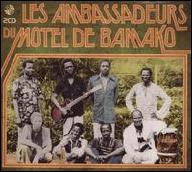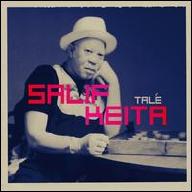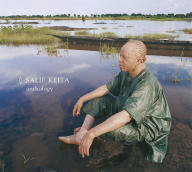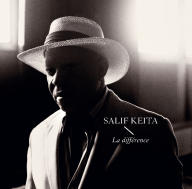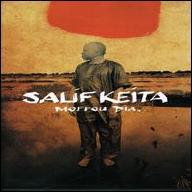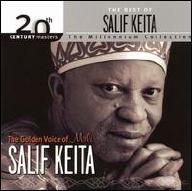One of the African continent's best-loved artists, Malian afro-pop singer/songwriter Salif Keita found initial success in the 1970s as a member of both
the Rail Band and
Les Ambassadeurs before moving to Paris and launching a high-profile solo career in the mid-'80s. Culturally rejected as a child for being an albino, Keita's talent and determination eventually led him to become known as the "Golden Voice of Africa." Albums like 1987's
Soro, 1990's
Amen, and 2002's
Moffou were critical and commercial successes that combined Western sounds of jazz, funk, and pop with West African traditions and saw Keita working with collaborators as diverse as
Joe Zawinul,
Carlos Santana,
Toumani Diabaté, and
Cesária Évora. Keita remained a creative force in the studio, returning with late-career highlights like 2010's
La Différence and 2018's
Un Autre Blanc, after which he announced his retirement from recording. Born to royal lineage, with ancestral roots going back to Soundjata Keita, the founder of the Malian Empire in 1240, Keita suffered a difficult childhood; he was ostracized by his community for his albinism and disowned by his father when he chose to pursue a career as a musician. Following his dreams, he moved to the capitol city of Bamako in 1967, where he spent a period working as a street musician and playing in nightclubs with one of his brothers. Within two years, he was invited to join
the Rail Band. A popular, government-sponsored group that played regularly at the Buffet Hotel de la Gare,
the Rail Band featured influential Malian guitar player
Kante Manfila. Keita's soulful singing soon brought the band to a much higher plateau. In 1973, Keita and several members of
the Rail Band relocated to Abidjian, the capitol of Cote d'Ivoire (The Ivory Coast). Naming their new project
Les Ambassadeurs Internationaux, the group continued to attract attention with their lively fusion of Cuban, Zairean, and Malian influences through the early '80s.
Following Les Ambassadeurs' breakup, Keita was encouraged to pursue a solo career and moved to Paris in 1984. Settling in the city's Montreuil section, he found a thriving community of more than 15,000 transplanted Malians. Predictions of success proved true with the release of Keita's debut solo album, Soro, in 1987. Produced by Ibrahima Sylla, the album combined African, jazz, funk, Europop, and R&B influences. His Grammy-nominated 1990 release, Amen, further appealed to Western audiences and included collaborations with Joe Zawinul, Carlos Santana, and Wayne Shorter. Keita continued his recording career with several releases throughout the '90s for the Mango, Melodie, and Sonodisc labels, including the Mansa of Mali anthology, before moving to Blue Note for Papa in 1999 and eventually Universal Jazz France, where he debuted with Moffou in 2002. Moffou was considered some of Keita's finest work to date, and he received another Grammy nomination for the album. Keita then returned to Bamako, Mali, in order to record his next full-length effort, M'Bemba, which came out in 2006.
Then in his early sixties, Keita returned to the studio for 2010's La Différence, taking an earthier, more acoustic-based approach and earning a Best World Music award from France's Victoires de la Musique. Two years later, he collaborated with Gotan Project producer Philippe Cohen Solal, veering in the opposite direction with Talé, which set his distinctive style to contemporary dance beats. Announcing his retirement from recording, Keita claimed that 2018's Un Autre Blanc would be the final album of his career. ~ Craig Harris, Rovi



